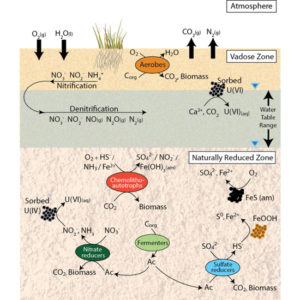
Water table peaking event mixes oxygen and nitrate into the anoxic Rifle floodplain aquifer. Naturally reduced zones containing sediments higher in organic matter, iron sulfides, and U(IV) rapidly consume DO and nitrate to maintain anoxic conditions, yielding Fe(II) from FeS oxidation, nitrite from denitrification, and U(VI) from nitrite-promoted U(IV) oxidation. Redox cycling is facilitated by coupled geochemistry, heterotrophy, and chemolithoautotrophy.
The study, published in Environmental Science & Technology, is one of the most comprehensive syntheses of processes and datatypes published to date and links BER’s investments in advanced multi-omics techniques and high-performance computing, representing the first critical stage in building a predictive understanding of natural hydrobiogeochemical processes at floodplain and larger scales.
Summary
Three-dimensional variably saturated flow and multicomponent biogeochemical reactive transport modeling is used to better understand the interplay of hydrology, geochemistry, and biology controlling the cycling of carbon, nitrogen, oxygen, iron, sulfur, and uranium in a shallow floodplain of the Colorado River in Rifle, Colorado. In this river-aquifer-vadose zone system, aerobic respiration generally maintains anoxic groundwater below an oxic vadose zone until seasonal snowmelt-driven water table peaking transports dissolved oxygen (DO) and nitrate from the vadose zone into the alluvial aquifer. The response to this perturbation is localized due to distinct physico-biogeochemical environments and relatively long time scales for transport through the floodplain aquifer and vadose zone. Naturally reduced zones (NRZs) containing sediments higher in organic matter, iron sulfides, and non-crystalline U(IV) rapidly consume DO and nitrate to maintain anoxic conditions, yielding Fe(II) from FeS oxidative dissolution, nitrite from denitrification, and U(VI) from nitrite-promoted U(IV) oxidation. Redox cycling is a key factor for sustaining the observed aquifer behaviors despite continuous oxygen influx and the annual hydrologically-induced oxidation event. Depth-dependent activity of fermenters, aerobes, nitrate reducers, sulfate reducers, and chemolithoautotrophs [e.g., oxidizing Fe(II), S compounds, and ammonium] is linked to the presence of DO, which has higher concentrations near the water table.
Citation
Yabusaki, S., M. Wilkins, Y. Fang, K. Williams, B. Arora, J. Bargar, H. Beller, N. Bouskill, E. Brodie, J. Christensen, M. Conrad, R. Danczak, E. King, M. Soltanian, N. Spycher, C. Steefel, T. Tokunaga, R. Versteeg, S. Waichler, H. Wainwright (2017). Water Table Dynamics and Biogeochemical Cycling in a Shallow, Variably-Saturated Floodplain. Environmental Science and Technology, 51 (6), 3307-3317, DOI: 10.1021/acs.est.6b04873
